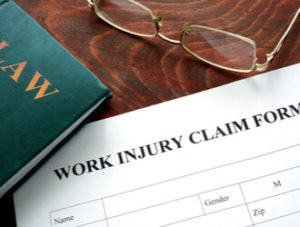 Lower back pain from sprains and strains—these common forms of back problems can cause major problems when you have to be out of work and file a workers’ compensation claim. Many of these injuries are invisible, and doctors have trouble diagnosing the root cause of the injury and the resulting pain.
Lower back pain from sprains and strains—these common forms of back problems can cause major problems when you have to be out of work and file a workers’ compensation claim. Many of these injuries are invisible, and doctors have trouble diagnosing the root cause of the injury and the resulting pain.
Workers may have jobs that require them to do a lot of lifting, bending, or standing in the workplace. According to the Occupational Safety Health and Safety Administration (OSHA), more than 100,000 people become victims of workplace injuries every year. Nearly half of the days lost from work come from strains, sprains, or soreness and pain.
Back Injuries Can Be Debilitating
There is little one can do to escape pain in the back. According to the National Institute of Neurological and Stroke (NIH), back pain is one of the most common reasons most people seek medical care. What is more astounding is they also report that approximately 20 percent of people still suffer from pain more than 12 months after their injuries.
These facts make it even harder for those who suffered from back pain following an injury because of an accident or long-term bending and lifting on the job to fully recover and return to their original employment. In these cases, a workers’ compensation claim may be your only option. If you are unable to return to work because of back pain, there is a chance the insurer will approach you about a worker’s comp settlement due to a back injury. Remember, you are entitled to collect benefits for as long as you are unable to work. However, you may also feel the need to reach a final settlement if this is the most financially feasible option for you and your family.
Your Employer and Workers’ Comp Claims
You must report a workplace accident or injury to your employer. Once you have made that report, it becomes the responsibility of the employer to report the information to the insurer who they are working with for their workers’ comp coverage. Keep in mind, most employers must maintain this coverage.
According to the Pennsylvania Department of Labor and Industry (DPLI), the insurer has 21 days following the report to issue their findings—this may be one of three notices:
- Notice of Compensation Payable
- Notice of Temporary Compensation Payable
- Notice of Compensation Denial
Should your claim be accepted, you may collect up to two-thirds of your wages once you are out of work for seven days, and workers’ comp will cover your medical costs associated with the workplace injury for as long as you require treatment. Workers’ comp may deny your claim may if it questions whether the injury occurred at work. Should this happen, you need to hire a worker’s compensation attorney immediately upon receiving the denial so you can protect your rights.
Job-Related Back Injuries
In many cases, a victim of a back injury must establish their injury happened at work. Remember, the insurer will most likely research your past medical history to determine if you have a history of back pain. If they do, they may deny your claim. However, you may still seek benefits, so make sure you know your rights and contact an attorney who knows the workers' compensation system.
Keep in mind, back pain can cause you other problems. People who have chronic back pain often have difficulty standing, sitting, driving, and often can't get a good night’s sleep. This may hamper your ability to return to work, even when your employer is willing to make accommodations. Construction workers, police, and firefighters often suffer debilitating back pain, making them completely or partially disabled.
Disabled Workers and Workers’ Compensation
If your employer has taken steps to reconfigure your job to accommodate back injury but your overall job description has changed substantially, you are entitled to claim benefits. Keep in mind, to qualify for benefits, the pain must prevent you from performing essential work functions. The insurer will review a written job description to determine whether you return to your normal employment based on medical records. When you cannot, then they may make the determination that you should be considered disabled.
Rather than continue to collect weekly workers’ compensation benefits, you may have the option of seeking a one-time settlement for your back pain. This approach comes with benefits and drawbacks, and each person will have to evaluate them based on their specific needs and the needs of their family.
Understanding the Pros and Cons of Workers’ Comp Settlements
When you learn you may never return to the workplace, your entire future may feel like it is in jeopardy. If you are considering seeking a workers’ comp settlement, you should understand a few things about the process, as well as the determination.
Seeking a settlement has some benefits. A settlement may help you better prepare for your financial future, and may help you feel more financially secure today, reducing some of your stress.
Settlements are good for insurers.
You should know that:
- Insurers benefit from quick settlements - one of the benefits an insurer will gain is they no longer have to worry about a future claim from you. Before you get a settlement, the insurer will have you sign a release, which means you agree they are not responsible for any future claims. Remember, this includes medical claims, surgery, hospitalizations, and any treatment you receive for your back injury.
- Injured workers often miss out - if you agree to a settlement too early, you could find you are getting an insufficient settlement to meet your needs. Remember, if you are facing a long-term problem, unexpected medical treatments could drain a too-small settlement.
- Insurers cannot force settlements - if the insurer contacts you, they cannot force you to accept any settlement, regardless of how generous it may seem. If the insurer tells you they will take you to court, call a workers’ compensation lawyer.
Before Considering a Workers’ Comp Settlement

If your workers’ compensation insurer has reached out to you and made a settlement offer, this typically means they are attempting to bring your case to a close. This can happen several months after you begin receiving benefits, or it may happen a year or more after you receive benefits. If an insurer offers a settlement, before you agree to anything, contact a workers’ compensation attorney to review it.
Here are some steps you should take before accepting a settlement:
- Complete medical evaluation - obtain a full medical evaluation of your injury and your pain, so you understand your long-term prognosis. Have your doctor explain what treatment options can mitigate your pain. Consider the cost of any treatment, including pain medication, physical therapy, and potential surgical options.
- Consider your family needs - everyone has a different financial picture. Some people own a home and would like to pay off their mortgage to free themselves from the burden of that monthly bill. A full evaluation of your finances can help you make a better decision.
- Impact on income from other sources - if you collect Social Security Disability along with workers’ compensation, a lump-sum settlement could impact those payments. Get a complete understanding of the impact you will face if you accept a settlement offer from workers’ comp.
Speak with an attorney who has experience handling workers’ compensation settlements before you agree to accept any offers. You can work with an attorney who can help you determine what amount of a settlement is appropriate given your age, your financial outlook, and the extent of your injury or back pain.
Long-Term Workers’ Comp Claims
If you collect workers’ compensation benefits over a long time, the insurer may question your medical treatments or tell you that your benefits may expire. Keep in mind, they must pay your benefits until and only if a doctor releases you from care—but these insurers have lawyers helping them and they know what they can use to reduce what they pay you.
No cost-of-living increases apply to workers’ compensation claims. Your maximum income will never exceed 80 percent of the income you made before your injury. This can challenge a family. These situations often result in an injured worker seeking a one-time settlement from a workers’ compensation insurer.
Why You Should Work With a Workers’ Comp Attorney
Obviously, if you lost work for a long time, you feel concerned about your financial picture and the financial future of your family. This is understandable. Knowing you cannot return to work is stressful. You now must determine what is best for your future—a future where the only income you have to count on is workers’ compensation payments and perhaps disability payments. This is why some back injury victims decide to seek settlements.
Settlements can work to your benefit. A settlement allows you to understand exactly how much money you have to live on from month to month, can be invested and withdrawn over time, and can help you feel like you are more in control of your finances. However, if the settlement is insufficient, you could face a whole new set of financial challenges.
Consider numerous factors before you seek or accept a workers’ compensation settlement. The best way to make sure you get the maximum possible settlement based on your medical condition, future medical care needs, and your family’s situation is to get an attorney involved early on in the process.
Remember, an insurance company is not likely to make you their top offer upfront. They use a standard metric that tells them what an average settlement is for a specific injury, and that will be the settlement offer they make you. However, they may fail to consider other factors such as what treatments you may need over your lifetime, your age, and your overall financial picture.

Insurers have lawyers to protect them and serve as an advocate for them—you need to work with an experienced workers’ compensation settlement attorney so you have someone who will serve as your advocate and get you the best possible settlement for your back injury.
When you have suffered a back injury in the workplace, you have the right to collect benefits until you have recovered from the injury, or doctors fully release you. However, if you suffered a back injury, that care you need for the rest of your life. Do not let any insurance company convince you to accept a settlement offer that is less than what you need to provide for your future. Instead, contact an experienced workers’ comp attorney who can help represent you in the negotiations and help you get the best possible settlement.
